#but with each return in time his influence grows and he will eventually become the most powerful king
Explore tagged Tumblr posts
Text
Time travel AU, but Merlin doesn't succeed
After Arthur's death, Merlin, in desperation, masters a very complex spell that moves him through time. Merlin traveled back in time to when he first came to Camelot. He relives all the events again, but everything seems to become more complicated and all his friends die again, and Arthur dies again in his arms, but under different circumstances. Merlin doesn't understand what he's doing wrong, because he's trying so hard to fix everything. He comes back over time again and again, again and again. But everything is unsuccessful, each time everything becomes more difficult, something cannot be avoided and everything leads to death.
After many returns in time, Merlin became colder towards everyone, closed in on himself and became completely gloomy and taciturn. This time Merlin smiles through force, does not seek to make friends with someone, because he is completely desperate and has already seen the deaths of his friends dozens of times. Everyone is trying to get closer to him, but he himself is moving away.
He again becomes Arthur's servant, saving his life. Arthur looks at him strangely and doesn’t understand why Merlin is so gloomy, he unconsciously wants to get closer.
Arthur: Merlin, there is something about you, I don’t know what, but you seem very familiar to me, did we know each other once?
Merlin, realizing that Arthur unconsciously remembers him, because they are two sides of the same coin: no, we have never met, you must be confusing me with someone.
Arthur looks after him and protects Merlin as if he is the most dear person to him (he is), without understanding why he does this, but still loves Merlin very much, although he will never be able to understand why he does not want to get closer.
#merthur#bbc merlin#merlin bbc#merlin#arthur pendragon#it's like madoka#Merlin is literally Homura#and Arthur is Madoka#Arthur is the once and future king#but with each return in time his influence grows and he will eventually become the most powerful king#Merlin will one day be able to save everyone#give him a rest#he's so tired
86 notes
·
View notes
Text
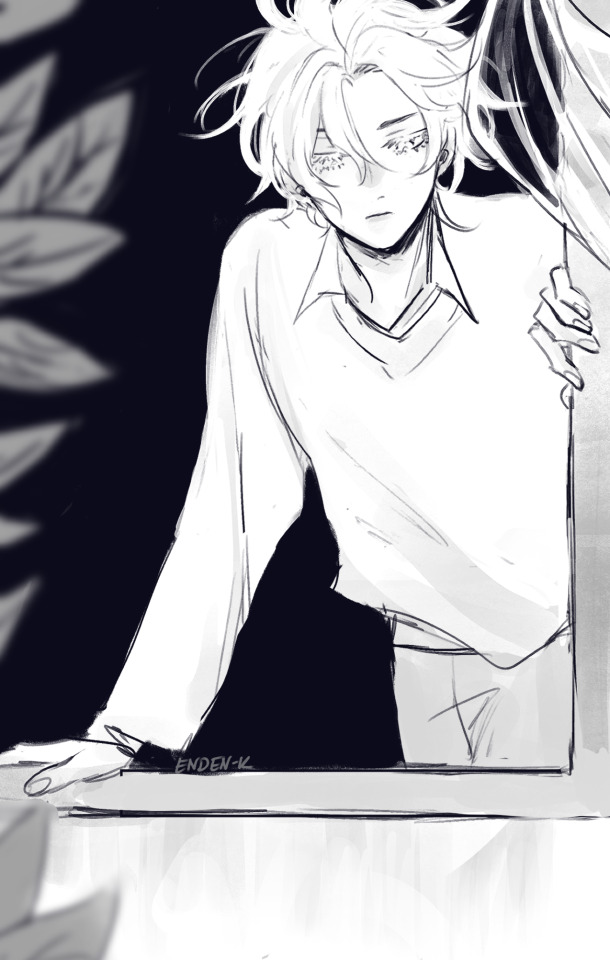
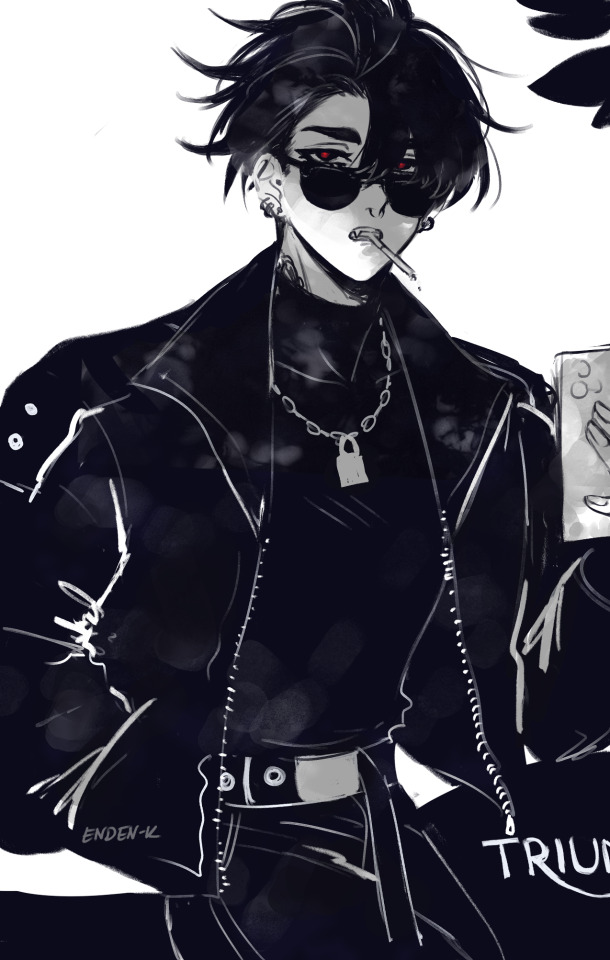
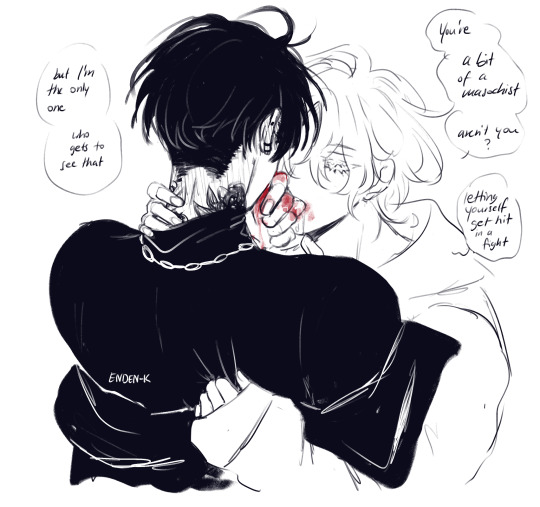
1st batch of random sketches of a loose ivlk au idea
in which ivan is a vocalist/lyricist in a band who lost his inspiration for music and finds it in luka, a burnt out musical prodigy, after getting entangled with him almost by fate; they become each others muse and obsession - and comfort
they share the similarity of being musical prodigies with abusive guardians/upbringing; ivan ran away from his and lives a free and unrestrained life singing in underground bars and clubs in a band he only joined bc of his best friend/childhood love. his feelings went unrequited for many years until he eventually and recently slowly got over it, coming to terms its no use and that they would never have a chance since hes "too intense", "too much", "not normal". bc of this, his inspiration disappeared since till was his muse all this time
luka stayed and became a golden-caged songbird, objectified and used by his possessive guardian bc of his talent. he was trained strictly since childhood and forced to perform on stage, study and pursue music, the only thing that he truly enjoys, to utmost perfection to the point of burn out and beyond. his guardian eventually passed and it left luka free but since his entire life was planned and dictated and control taken from him, he feels lost and alone, unsure what to do. music was the only purpose in his life, the only thing hes good at, he can do; hes burnt out and exhausted but still continues, the things his guardian ingrained into his mind still controlling his behavior and life
when luka meets ivan, his love for music gets rekindled without the pressure and abuse that loomed over him all his life; when ivan meets luka, his inspiration and love returns. theyre both scarred from their similar upbringing and situation which influences a lot of things they are/do (e.g. tendencies to become obsessive/possessive,...) theyre both considered and branded "odd" by people around them but they learn they can let go of their masks around each other and be themselves, finding comfort and healing together. what started as an entanglement w mutual benefits grows into mutual love
i babbled quite a bit kjhbkjbj.. 🧍♀️
(as obvious above, i love keeping close to canon while also mixing in own thoughts/my hcs when i do AUs so yea, luka still has asthma, migraines etcetc, but theyre also both autistic (not planning to make it relevant or focus, im just throwing it out there) and luka has an ED)
#own art#sketch#ivanluka#alnst ivan#alnst luka#alien stage#ivlk AU#until i think of a fitting one word AU tag
776 notes
·
View notes
Text
The theme of dual perspectives in modern k-dramas :

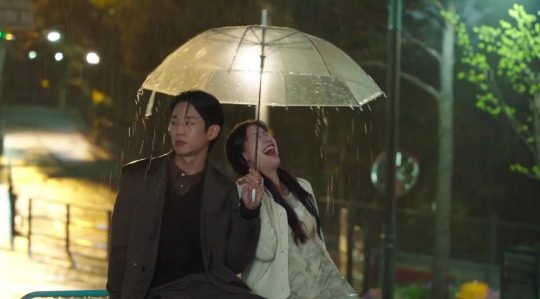
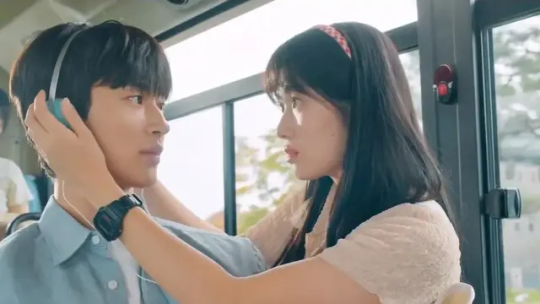
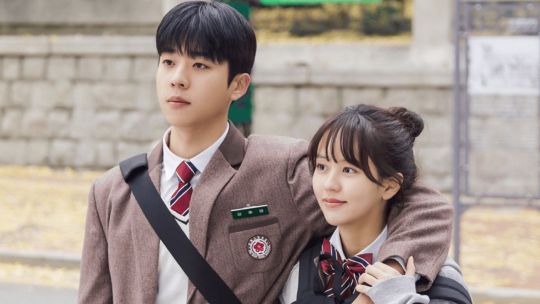
The idea of presenting stories from the point of views of both the male and the female protagonist sounds refreshing it also adds a layer of depth to understanding the dynamics of their relationships.
"Memories are unstable because some memories are only remembered by one person" - Serendipity's Embrace (2024)
This means that hidden feelings always make way for difference in povs. One might assume what the other feels , but in reality the povs always add a flavour to it. It brilliantly highlights the fact that one situation cannot be judged from the third person's perspective unless we hear both the sides of the same story.
The famous episode 2 of Lovely runner that presents with the pov of Sun-jae that he had always and always been in love with Sol just changes the way we see their love story. And the fact that writers have been continuously coming up with this theme screams that it's indeed the best when it comes to creating a tapestry of emotions and memories.
"Memories don't disappear, they're all smeared into one's soul" - Lovely Runner (2024)
The fact that all these four dramas have been not just plainly romcoms but also presents a source of "interest" in the characters who have known each other for a long time. Cause true feelings just grow and don't dissapear after some moments of staying away from each other.
“Everyone has unforgettable memories from a certain year of their life. They cherish those memories so much that it lasts a lifetime.” - Our Beloved Summer (2022)
All these stories have used "memory" as a tool for story telling. The use of memory as a narrative tool emphasizes the impact of time on relationships. The past isn’t just something that happened; it’s something that continues to live within the characters, influencing their decisions and emotions in the present.
The episode 4 ending of Love next door (2024) symbolizes this same idea when they show the transition from "past perfect -> present perfect continuous"
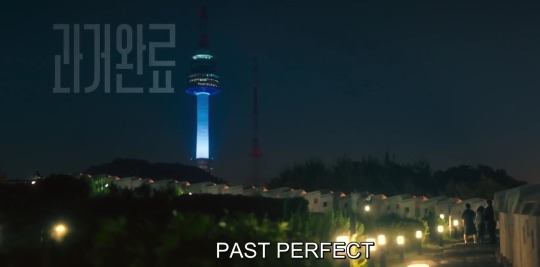
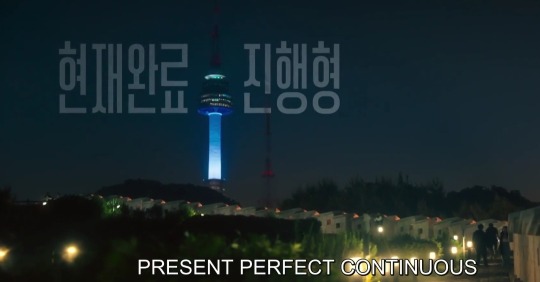
"Your memories don't mean anything. They are all in the past" - Love Next Door (2024)
By intertwining their perspectives with memories, the writer crafts a narrative that resonates with viewers on a personal level, reminding us of our own cherished or even painful memories and how they’ve shaped our lives. It’s a testament to the idea that we are all, in some way, a product of our past, and that understanding another person often means understanding their history as well.
Here , "First love" also eventually becomes a plot device for exploration. It becomes not just a memory but a recurring theme that influences the characters' actions and decisions. The beauty of exploring first love through two different perspectives is that it allows the audience to see how the same moments can be cherished, misinterpreted, or even forgotten by the two individuals involved. What might have been a fleeting moment for one character could be a defining memory for the other.
"I know all of seunghyo’s firsts: the first day he drank banana milk, the first day he started swimming, the first day he surpassed my height. the only thing I didn’t know was his first love” - Seukryu in Love next door (2024)
[We all know who his first love is though haha]
Therefore,first love, in these dramas, often serves as a touchstone for the characters' development. It’s something they return to, either consciously or subconsciously, as they navigate their current relationships.
#kdrama#our beloved summer#lovely runner#love next door#serendipity's embrace#choi wooshik#kim dami#byeon woo seok#kim hye yoon#jung hae in#jung somin#kim so hyun#chae jong hyeop#memories#soulmates#love#falling in love#first love#love story#kdrama lover
129 notes
·
View notes
Text
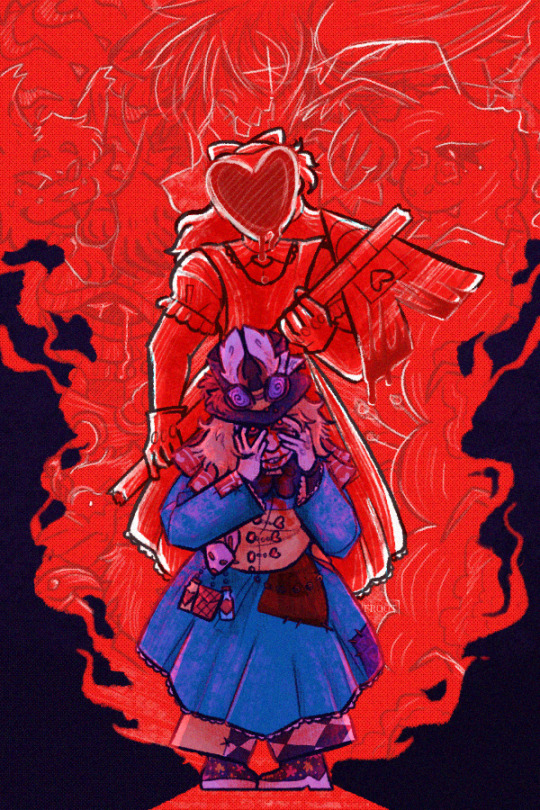
happy hatter day to all those who celebrate >:]
Jervis Tetch seemed to one day just...appear in Gotham. Jervis simply popped into existence in Gotham's foster care system with an Alice in Wonderland book in his hand; no records of his birth or who dropped him off there, if anyone. Jervis himself can't remember where he came from before Gotham, but if you asked, he'd figure he just fell down the rabbit hole and ended up here.
Jervis was placed with many different foster families over the years. She never seemed to mesh right with any of those she was placed with, and spent very little time in each before being returned and shipped off to another. Being so young (and already pretty fragile, mentality-wise), Jervis' brain needed a way to cope with the ever-shifting, confusing mess that was her life.
In came Alice in Wonderland.
Imagining the homes she was placed into as the various places traveled to through Carroll's books made things a lot easier for him to deal with. It even became fun, after a while! He would slot the adults or the other children inside the home into specific roles within his mind's version of Wonderland, and would treat them and act out scenarios accordingly. Whenever he was pulled out of his Wonderland, he would become foggy, distant, and downtrodden - like the world had lost it's color.
(This growing disconnect with reality would only increase how many times she was placed in a different home.)
Eventually, Jervis outgrew the foster system, and shipped herself off to Gotham City University. While her first literature love would always be the Alice in Wonderland series, she had devoured anything that related to the mind and the influence of it. During her time in college, she spent her free time perfecting the act of hypnosis - almost to a scarily good extent. Though at first she only used this to make a little extra money from doing shows at parties.
Jervis graduated with a bachelor's in science and almost immediately joined the new, experimental neuroscience branch that Waynetech had begun developing.
Though most of the work there was doing research, Jervis loved his job, and stayed long enough to earn his Ph.D. in Neurochemistry and work his way up to directly working with the chemicals Waynetech was developing. Of course, the people working alongside Jervis weren't the best. She was funny-looking, and weird, and talked far too much, so that made her quite unpopular with just about everyone. All except for one Alice Hart.
Jervis thought he had long left Wonderland behind him, but suddenly it was back in full swing, invading every moment of free time with daydreams of tea parties with Alice in his lovingly-crafted Wonderland, all the roles filled perfectly so he would never have to venture outside of it again. A growing friendship with Alice herself in the real world did nothing but worsen Jervis' obsession.
But work had to continue, and Jervis had stumbled upon an idea that really captured her attention. A way to chemically influence the brain to do whatever you'd like it to do - like a form of liquid hypnosis. This had started with good intentions, but as Jervis gradually approached the rabbit hole, the development for it became...more unethical. Her first tests were on mice, and then on herself, which only proved to make her mind float even further from the real world. But it worked! When injested, it was less outright control and more suggestibility, but paired with her knack for hypnosis, she had invented mind control.
Her debut of what she'd found didn't go over well. Their creepy coworker, who seemed less-than-grounded on the best of days, inventing a way to control people's minds? That spread rumors around the branch, and eventually, Jervis' bosses made the collective decision to terminate him. While he was brilliant, they had been looking for an excuse to replace him with someone less, well....mad.
This devastated Jervis. But he at least had one thing to cling to - his dearest friend, Alice. She had supported her throughout all of it, and when Jervis plucked up the courage to ask her out for a night, she agreed. What she didn't know upon arriving at her home was that Jervis had long past gone over the edge, and the tea she offered had a little something other thrown into it.
]See, Jervis had concocted a plan. He gathered all of the people in his former company that he thought best fit the roles in his Wonderland, including his Alice, and took them to the Alice in Wonderland exhibit at the Gotham Museum. There, he forced them to reenact his favorite book series with him, the lines between reality and fantasy finally becoming one.
Batman came to the rescue a few hours into it, when Jervis had already been struggling to keep so many people under her spell. She fought back the Bat as best as she could, but it was actually Alice who put a stop to it. Alice, who had managed to snap out of Jervis' control and pick up a prop axe from one of the exhibits, caving in her captor's head with it when she wasn't paying attention. Though the axe was blunt and not made of actual metal, it was still a very heavy object, and before being taken to Arkham Jervis had to undergo extensive medical treatment that she'd never fully recover from.
Nowadays, Jervis drifts in-and-out of Wonderland once again. He is desperate to put all of the pieces back together and live his dream, but he can be patient. He's content to make friends with the other Rogues and help them out when his skills are needed, and in turn be seen as harmless to them.
For now.
219 notes
·
View notes
Text
About the interview translation
woah, i didn't think it could get that many engagements like i expected. thank you everyone so much! i thought this type of blog is not getting too much attention due to its wordiness!
anyway, because i have several changes throughout the time so the first reblogs are not "kind of informative enough". i added some information about the inspiring characters for takamatsu-sensei so you can have a deeper perspective about shima and mitsumi at first ground-up.
my current blog: link
you can read the rest here! (if you read old reblogs)
Factual
Shima Sakon and Ishida Mitsunari are two fascinating figures from Japan’s Sengoku period (1467–1615), an era of political upheaval and near-constant military conflict. Mitsunari was a high-ranking samurai and one of the key strategists for Toyotomi Hideyoshi, a unifier of Japan. Known for his intellect and strict adherence to rules, Mitsunari was often described as cold, calculating, and socially inept—qualities that earned him respect from some but disdain from many. His inability to navigate interpersonal relationships and his unrelenting idealism made him a polarizing figure in the Toyotomi camp.
On the other hand, Shima Sakon was a samurai who eventually became Mitsunari’s right-hand man, joining him during the latter’s rise in the chaotic power struggle following Hideyoshi’s death. Sakon was known for his military prowess, tactical skill, and charisma, which contrasted sharply with Mitsunari’s intellectual but often distant demeanor. Sakon reportedly referred to himself as a “wandering ronin” before aligning with Mitsunari, but once he joined, he was unwavering in his loyalty.
What made their relationship stand out was its deeply personal undertone, rare for a lord-retainer dynamic of the time. Mitsunari was a man who struggled to gain allies due to his blunt nature and rigid personality, yet Sakon saw beyond these traits. He recognized Mitsunari’s intelligence and idealism, appreciating his flaws as part of his humanity. In return, Mitsunari trusted Sakon in ways he couldn’t trust many others. Their bond went beyond strategy or battlefield hierarchy—it was grounded in mutual respect and understanding.
Their connection becomes especially poignant in the context of the Battle of Sekigahara (1600), one of the most pivotal conflicts in Japanese history. Mitsunari led the Western Army against Tokugawa Ieyasu’s Eastern Army, and Sakon played a significant role as a commander. Despite their combined efforts, the Western Army was decisively defeated, and both Mitsunari and Sakon met tragic ends—Sakon was mortally wounded in battle, and Mitsunari was later executed. Their fates reflect the collapse of their ideals in the face of political reality, but their loyalty to each other remains an enduring legacy.
In Sekigahara, a historical novel by Ryotaro Shiba, their relationship is portrayed with nuance, focusing not just on their roles in the war but on their personal dynamic. Mitsunari is painted as a misunderstood figure, awkward but driven by a sense of justice, while Sakon serves as his grounded, pragmatic counterpart. It’s this understated connection—marked by loyalty, respect, and a recognition of each other’s imperfections—that resonates deeply.
This dynamic, as Takamatsu-sensei mentions, subtly influenced the relationship between Mitsumi and Shima in Skip and Loafer. Shima, much like Sakon, begins as an idealized figure—a “prince” type who seems perfect but reveals vulnerabilities as the story progresses. Mitsumi, on the other hand, mirrors Mitsunari in her straightforwardness, occasional obliviousness, and quiet strength. Their connection isn’t easily categorized—it’s not purely romantic, nor is it strictly platonic. Instead, it’s about two people growing together, balancing each other’s strengths and weaknesses in a way that feels natural and deeply human.
The parallels between the historical duo and Takamatsu-sensei’s characters highlight the timelessness of certain human relationships. Whether it’s two samurai navigating the chaos of war or two high school students finding their place in the world, the essence of connection—flawed, messy, and quietly profound—remains the same. It’s not about perfection or grand gestures but about understanding and complementing each other in ways that make the journey worthwhile.
Personal thoughts
shima sakon and ishida mitsunari are these figures from japan’s sengoku period, and their story feels weirdly timeless. mitsunari was this brilliant strategist, but he was also terrible at winning people over. he had no filter, couldn’t sugarcoat things, and honestly came off as cold or arrogant most of the time. but the thing is, it wasn’t like he was trying to be difficult—he just didn’t know how to be anything other than himself, even if that made him unpopular.
then you’ve got shima sakon, his retainer, who wasn’t just loyal but actually understood mitsunari in a way that most people didn’t. sakon looked at him and thought, “yeah, this guy’s awkward and kind of terrible at communicating, but that’s what makes him human—and honestly, a little endearing.” sakon didn’t see mitsunari as this cold figure; he saw someone trying, even if he wasn’t great at it.
their relationship wasn’t just about duty or ranks—it felt personal. sakon stuck around not because he had to but because he respected mitsunari, flaws and all. and mitsunari, even if he wasn’t great at showing it, clearly leaned on sakon in ways that went beyond their roles. together, they balanced each other out—mitsunari’s sharp mind paired with sakon’s charisma and groundedness. they were stronger because they had each other.
what’s so compelling about their bond, especially as it’s portrayed in sekigahara, is how understated it is. it’s not about big, dramatic moments—it’s in the quiet, everyday loyalty that doesn’t need to be spoken. it’s messy and imperfect, but it feels so real, and that’s what makes it stick with you.
in skip and loafer, you can kind of see shadows of that dynamic. shima starts out as this “prince” figure, someone who seems perfect on the surface, but as the story goes on, you see the cracks, the insecurities he carries. and mitsumi, with her straightforward and awkward charm, reminds me a little of mitsunari. she tries so hard but doesn’t always realize how she’s affecting others. their relationship, like mitsunari and sakon’s, isn’t easily defined. it’s not just friendship, and it’s not exactly romance—it’s about two people quietly growing and balancing each other in unexpected ways.
and i think what makes relationships like these so memorable is how real they feel. they’re messy and don’t fit into neat boxes, but that’s the point. whether it’s a warlord and his retainer or two high schoolers figuring out life, it’s those small, imperfect moments of understanding that make you feel something. it’s not about being perfect—it’s about being human, together.
the image on the left is mitsunari and on the right is sakon!


17 notes
·
View notes
Text
WILLIAM AFTON x READER NON CON II
You’re a babysitter for the Afton Family, and while waiting for William to come back home so you can leave, you fall asleep. When William comes home to you sleeping on the couch, he takes advantage.
THIS STORY INCLUDES RAP3/NONCON/AGE GAP. MINORS DO NOT READ I WILL BLOCK YOU. NSFW 18+ STORY. PROCEED WITH CAUTION.
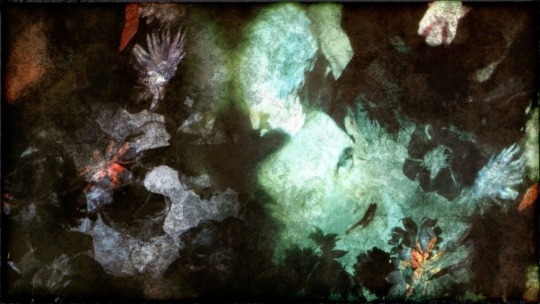
You had been babysitting the Afton children for nearly a year now, and over that time, you had become quite familiar with their family dynamics. It was clear to you that William and Clara, the parents, were not on the best of terms, while their children, Elizabeth and Evan, remained blissfully unaware of the tension that lingered beneath the surface.
You genuinely adored their kids. Surprisingly well-behaved, they were also delightful company. You took joy in helping Elizabeth with her outfits and styling her hair. In many ways, she felt like a reflection of your younger self, and you couldn't help but feel a sense of nostalgia each time you saw her.
Evan, on the other hand, was a natural-born jokester. You could easily envision him growing into a charming ladies' man in the future.
But you took it upon yourself to set boundaries when he joked about girls. You were worried about how his father would influence him as he grew up. You had a clear understanding of the kind of man William was.
William was the type of man who made inappropriate comments about your clothing, who could stare at you long enough to make your skin crawl. He had a way of crossing lines, even going so far as to grope you when his wife or kids weren't in sight. You had become used to this unsettling behavior. You made sure Evan didn’t follow in his father's footsteps.
Despite everything, you genuinely enjoyed babysitting for the Afton family and planned to continue as long as they needed you. That was until one fateful Saturday night when everything took a turn.
Clara was out of town visiting her mother, and William had to stay late at the pizzeria. He called you at the last minute, and you gratefully accepted, knowing they were generous with their pay.
It was nearing 11 PM, and William still hadn’t returned. You had tucked the kids in by 9, and now you found yourself sprawled out on the couch, mindlessly watching whatever was on TV. As the hours ticked by, you felt your eyelids growing heavier. Despite your attempts to stay awake, your body eventually succumbed, and you drifted off to sleep.
Nearly an hour later, William finally returned home. He hung up his jacket and keys, his gaze drifting to the couch where you lay.
He paused, taking in the sight.
You were sprawled out on your back, your legs slightly parted, hair partially covering your face. You had removed your sweatshirt, leaving you in a revealing tank top that had ridden up to expose your stomach. Your sweats hung loosely on your frame, threatening to slip down as you shifted in your sleep.
William approached you, standing over your sleeping form.
“C’mon now,” he murmured, mostly to himself, “You can’t lay here like that and expect me not to touch you.” He chuckled, feeling his cock twitch with desire. He leaned in closer, untying your sweats and slowly sliding them off your legs, revealing your plain, unassuming panties. But to him, they were everything because they were yours. “You’re fucking killing me,” he muttered as his fingers traced the hem.
William couldn’t resist any longer. He unbuckled his belt and unzipped his pants, one hand slipping beneath his boxers to slowly stroke himself, his gaze fixed on your figure.
“The things you do to me,” he chuckled to himself, his eyes roaming over your body.
Once he was fully erect, he positioned himself between your legs, spreading them apart just enough. He took a deep breath, savoring the sweet scent of your hair, and with that, he thrust himself inside you, uncaring of the noise he made.
Your eyes snapped open the instant you felt his cock inside you. A scream nearly escaped your lips, but his hand clamped over your mouth, silencing you. “Shhh,” he whispered, slowing his pace. “I know, I know,” he said, sensing your panic as you struggled to escape, but his weight kept you pinned down. “It hurts at first, but if you relax, it’ll feel real good, sweetie.”
“Mff!!” You shook your head frantically, but he chose to ignore this. His voice was a low, soothing murmur, but the fear in your eyes was unmistakable. He continued, his free hand gently stroking your hair.
“Yeah, that’s it,” he coaxed, “Let it happen…”
“Mffff!! Mfff!!” Your eyes were wide as you struggled to breathe against his hand that stayed clamped over your mouth.
"Don’t fight it," he murmured, his voice a seductive purr. "Just let go…"
His hand moved from your mouth to your hair, gripping it tightly as he forced your head back, exposing your neck. "Do you like that?” He grinned down at you, “Do you like feeling me inside you?" His tone was taunting, his words a cruel blend of seduction and threat.
"Please…" you whimpered, your voice barely a whisper.
"Please what, sweetie?" he taunted. "Please stop? Or please keep going?"
You sobbed, shaking your head. “Please stop!” You finally managed to yell, but his hand clamped over your mouth to silence you once again.
"Look at you," he sneered, "So helpless…" His hand moved down to your waist, gripping it tightly as he forced you to arch your back, his thrusts becoming almost violent.
He loved the fact that you were completely at his mercy, your squirming and feeble attempts to resist only fueling his sadistic pleasure. He was so much taller, so much stronger, and you stood no chance against him.
The only sounds breaking the silence were your muffled protests merging with his soft, breathy moans, so close they resonated against your ear. Tears blurred your vision, yet your eyes remained open, helplessly fixed on the ceiling above.
William's soft, dark hair brushed your face as he leaned down, pressing a trail of gentle, taunting kisses along the line of your neck, lingering just enough to unsettle.
“So perfect,” he murmured, his body tending. You senses his climax, a wave of dread washing over you. He wasn’t pulling out.
And inevitably, William shuddered, groaning your name to himself, the harshest violation of all, and finished inside of you.
As he finally pulled away, William gazed down at you, running a few fingers through his tousled hair with that disarming smile. “Damn,” he breathed out, clearly catching his breath. “Usually I don’t cum that fast, but…fuck,” he chuckled, shaking his head. “Guess you deserve a raise,” he joked casually, straightening himself up as he began to dress.
You lay there, frozen. You didn’t dare look down—you could already feel the unwelcome mix of blood and semen coating your inner thighs. You felt nauseous.
William’s gaze swept over you again, lingering on your rigid form with a smug satisfaction that only deepened the ache in your chest.
"C’mon doll, don’t go making me feel guilty now,” he chuckled as he adjusted his belt with an air of practiced ease.
You fought against the tears building up, but your body betrayed you, and they spilled over, silent and unstoppable. Watching you, William cocked his head, letting out a small, dismissive sigh before lowering himself onto the couch beside you. You instantly curled up, trying to put as much distance as possible between you.
“That was your first time, wasn’t it?” he asked, but you couldn’t muster a response. The look in your eyes told him everything. “Aww,” he mocked, “I feel so special!” He leaned in, eyes locking onto yours, “I am special, aren’t I?”
As he spoke, each breath felt heavier, an effort to steady the swirling nausea in your stomach. William's satisfaction was very evident. He was savoring your discomfort with each passing second.
“So,” he continued with a smirk, “are you going to just lay there shaking, or are you going to say something?”
Every fiber of your being urged you to get up, to leave. But his stare held you captive. He simply laughed, a quiet, chilling sound that seemed to echo in the room.
“You know, the more you act like this, the more I wanna do it again,” he murmured, leaning closer, his fingers tracing delicately up your leg.
You recoiled instinctively, shaking your head in desperation. “No, please, no,” you whispered, voice trembling.
William chuckled, pulling his hand back. “There we go,” he said smoothly, a smile tugging at his lips. “Now, get dressed. I’ll drive you home.”
A shiver ran through you, and you turned your face away. “I’ll walk,” you mumbled, the words barely audible. His laugh cut through the silence, dismissive and laced with a twisted sense of humor.
“Oh, absolutely not,” he said, still laughing. “Come on, sweetheart. Get up. I know you can do it!” He urged, his tone mocking.
With a deep sense of shame, you pushed yourself to your feet, your eyes dropping instantly to the marks left behind—a sickening mix of blood and semen staining the couch and streaking down your legs. Fighting the urge to crumble, you began dressing slowly.
All the while, William lounged back, watching you with a smile.
Finally dressed, you headed towards the door, William following. But as you reached for the handle, his hand shot out, catching your wrist in a firm, casual grip. The touch sent an icy shiver up your spine, and your eyes darted down, fixed on his fingers wrapped around your wrist, then back up at him, his eyes wild and pupils dilated.
“You tell anyone about what we just did,” William whispered, leaning in, “I will kill you.”

ao3: z0mbi3girl444
#william afton#five nights at freddy's#dave miller#fnaf#william afton x you#william afton x reader#william afton fnaf#william afton fanfic#william afton smut#rape/noncon#non consent#tw noncon#springtrap#rapevictim#cw rap3#tw rap3#age g@p#age g4p
14 notes
·
View notes
Text
MEET THE OC: ANDREW HAIN
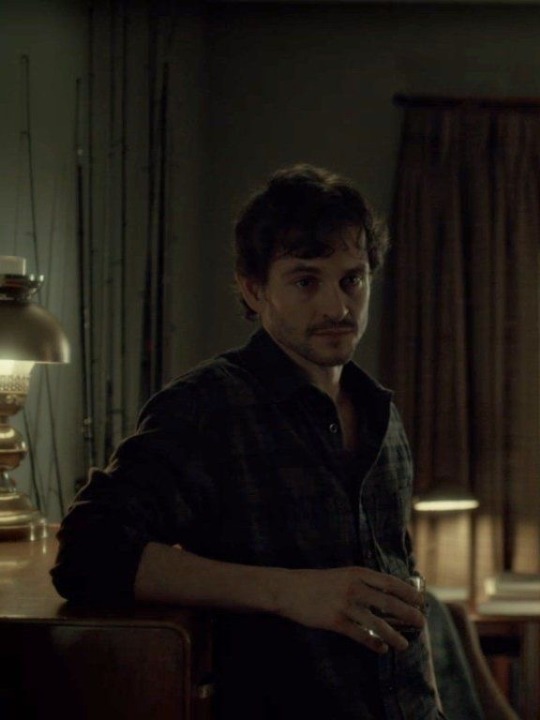
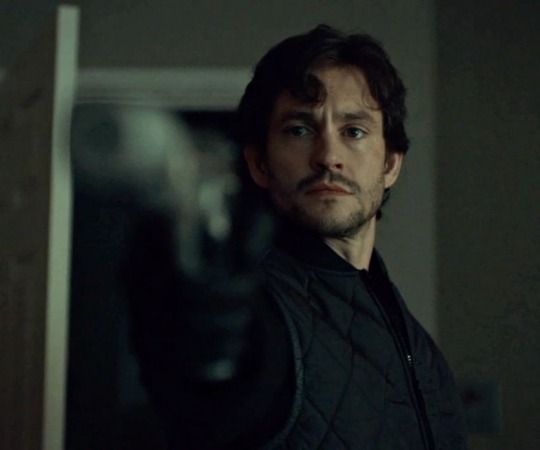
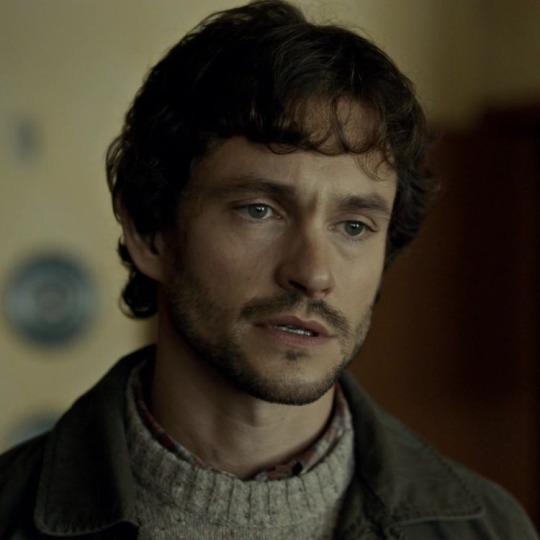
“walls have ears. doors have eyes. trees have voices. beasts tell lies. beware the rain. beware the snow. beware the man you think you know.”
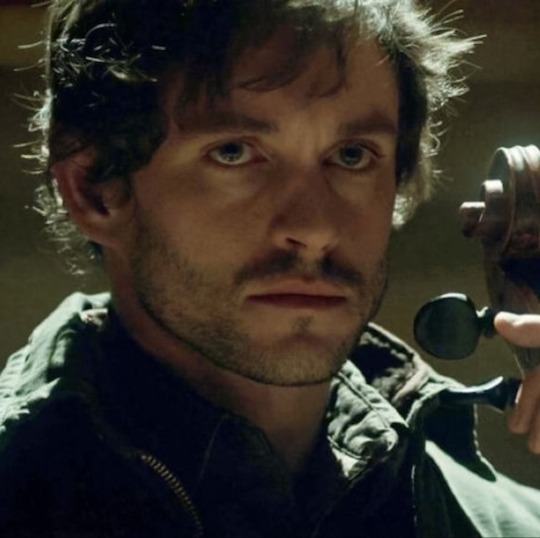
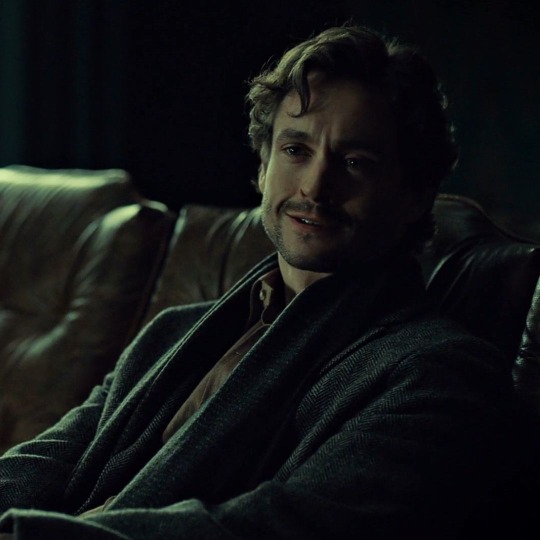
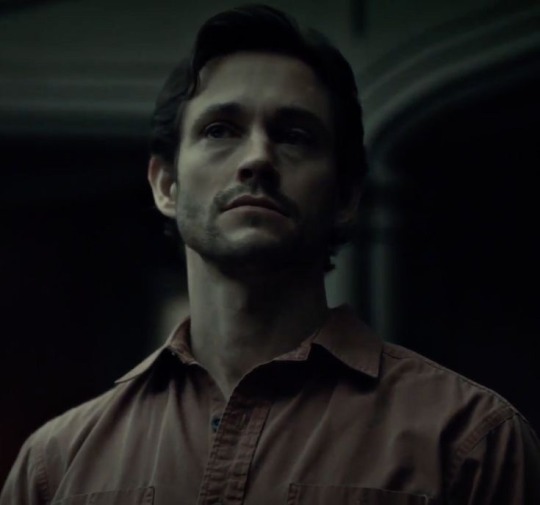
ABIGAIL OC • INTJ • HE/HIM • 36 Y/O • 5’10” • FC: HUGH DANCY

Andrew was always a bit of a mysterious person, carrying a troubled past with him. He was born an only child in a particularly shitty neighborhood in New York, with two alcoholic drug addicts for parents. Growing up, he would always witness them fighting, and as he got older, Andrew had to sort of be his own parent.
After graduating high school (which he excelled at academically), Andrew decided that he wanted to work in law enforcement, perhaps influenced by his tough upbringing. He went to college to obtain a degree in criminal justice, and then went ahead to enroll in a police academy. When he joined the ranks of the NYPD, Andrew quickly earned the respect of his colleagues for his high intelligence. Thanks to his stoic, monotonous demeanor, he was perceived as an intimidating figure, but… he was actually a good person.
Well, until he befriended Adam Barrett.
The two of them got to know each other while working as vice detectives, with Adam being what Andrew would consider his only friend. It was the same for Adam — Andrew was his only friend, at least the only person that Adam considered a friend. One could say that Andrew wasn’t the same person after becoming friends with him.
When Andrew and Adam started getting to know each other, Andrew took notice of the fact that he was definitely more of a morally ambiguous kind of person. When the two of them were working with each other during investigations, Andrew found his behavior intriguing. When dealing with criminals, Adam seemed to be fascinated by them just like Andrew, but in a… darker sense. When the pair were working undercover, Adam didn’t hesitate to dabble in a little criminal behavior himself. Eventually, it got to the point where he’d offer to let criminals go if they gave him a little something in return. It seemed like each day, Adam’s behavior grew increasingly questionable, and his morals became more corrupt. The more time the two spent dealing with criminals, the more Adam realized that he found lawfulness boring. He started to grow unsatisfied with working as a detective, finding himself sympathizing more with the people he was supposed to be arresting.
Understandably, Andrew became concerned. He had decided to join law enforcement with the intention of protecting people, not whatever the hell Adam had going on in his mind. It became more and more apparent that he was only in it for the power, not keeping the streets of New York clean.
When Adam wasn’t working as a detective, he was a part-time criminal himself, something that Andrew didn’t find out until the two of them were given the task to investigate Lazar. Now that he had Andrew as a friend, Adam saw the opportunity to try and persuade him to switch sides. He was a smart man, able to see right through Andrew. In a sense, he knew the man better than Andrew knew himself.
Investigating Lazar seemed to open some kind of metaphorical Pandora’s box, and Andrew wasn’t the same after that. The both of them became associated with him somehow, and it seemed to complicate their friendship. He took an interest in Adam’s interactions with a new inmate — Sylvia Halford. Sylvia had been on Lazar’s radar due to her history with a particular associate of his, Charlie, and it seemed that Adam was getting a little too friendly with her. Whatever was going on, Andrew took note of it. Even after Sylvia left the jail, Adam would talk to him about her in a rather “fond” way, and it had Andrew wondering…
Not long later, the pair abandoned their lives as detectives in New York, moving to Massachusetts and deciding to fully immerse themselves in the criminal world. Andrew in particular became involved with drugs and violence, ending up as a hitman. One night, he decided to snitch on Adam to Lazar about his little “crush” on Sylvia, and after that… well, Andrew and Adam quit being friends. Andrew didn’t want anything to do with him anymore, and it seemed the same for Adam. The times they did see each other, it was, well… awkward. Perhaps Adam just got tired of Andrew.
Fast forward to a while later, and Andrew had decided to try and start his life all over. He didn’t want anything to do with Lazar’s criminal underworld anymore, but it was clear that his former life had left its mark on him. Now, he was lonely, drinking and doing drugs… just like his parents. Little did he know that Adam — now Frank — and Sylvia had ended up in a kidnapping mission, and it turned out that Sylvia had been dragged into it not only because of her connection to Lazar, but also Frank. Andrew’s words had come back to bite him in the ass… and that was how he and Frank crossed paths again.
Upon returning to his apartment after the whole mess to nurse Sylvia back to health, Frank called Andrew on the phone, clearly pissed off. He didn’t care that Frank was angry at him. In fact, he had been expecting it. A few days later, Andrew encountered Sylvia while she was hanging out at a park. After learning that she had been staying with Frank for the past few days, Andrew had an idea. Perhaps he and Frank could try and make amends, maybe even become friends again. And so, at Andrew’s request, Sylvia brought him back to Frank’s apartment. Surprisingly, Frank didn’t seem to be enraged with Andrew anymore. The two of them ended up reconnecting, which would prove to be a very bad idea.
And so, it was back to old times, the two of them returning to being the fucked-up duo that they had once been.
13 notes
·
View notes
Text
Obito Headcanons
(These are from my old blog).
These headcanons are usually about Obito being a shinobi of Konoha or as a Hokage:
-Obito is able to unlock Susanoo even with one eye. (If Shisui can do it in the game, so can he.)
-Even if he returns to Konoha from Madara's hideout and grows up and becomes the Hokage, Obito still suffers from PTSD. His PTSD is what fuels his desire to put an end to fighting and maintain deep bonds in the village.
-Obito is a Cat Dad. As we all know, it's the one-eyed black cat whom he names Tobi.
-Obito is one of the scariest shinobis that enemies have ever come across, because of how stealthy and unpredictable he is. Sometimes they call him "the cheater of death" because he always manages to fool his enemies into thinking that they got him, but nope.
-Obito would be a member of the Konoha Military Police Force in an AU where he returns to Konoha or if he survives the boulder. :)
-As he matures, his personality is more reserved and collected. There are times when he gets reactive, like when Kakashi gets all snarky on him, but other than that, he becomes less of the stubborn boy he was (depends on the circumstance, because he does get hardheaded at times) and more focused.
-This may not be a headcanon, but when I first saw that Obito is an Aquarius, I couldn't think of anything more right for him. I'm no expert in zodiacs, and I don't know if it's a coincidence, but honestly, I think Obito being an Aquarius is a completely fitting horoscope, especially for the type of character that he is. Ambitious, clever, and also rebellious - he refuses to be a sheep to the norm of society, in this case the shinobi world.
-Obito incorporates his Akatsuki leadership skills into his role as the Hokage. He is a good leader. He gives off a rather intimidating vibe (despite his friendliness), and he definitely cannot stand anything that falls out of order. He is ruthless when he needs to be. His enemies are definitely afraid of him, because once he's provoked, it's over.
-Obito would be the one to lead Danzo's termination (or execution) because he's the one that sees through Danzo's bullshit, and Obito would influence the Konoha Council and Hokage to see through Danzo and expose him as a traitor of the Leaf that wants to annihilate the Uchiha and overthrow Minato as the Hokage.
-Obito would actually be the bridge of peace between the Uchiha Clan and Konoha. At the starting, the Uchiha Clan considered him to be the "black sheep" because of the fact that Kakashi achieved more than he did. But Obito is simply a late bloomer. As he grows up, he would eventually surpass Kakashi. Hell, his Sharingan had 2 tomoe when he first unlocked it, and that's already a stepping stone to becoming a stronger shinobi of his clan. And when he does, Obito becomes more respected by the clan, and in a way, he can influence the underlying political tension between the Uchiha and Konoha. Obito would be the one who is capable of dispelling the unrest and allow the village and the clan to form a better truce.
-Obito loves to stay in shape, so he exercises every day. It's one of his best hobbies.
-Obito would actually be really good friends with Shisui and Itachi, and the three of them working together as a team makes them one of Konoha's strongest trio of the Uchiha Clan. They're the first people in his clan to acknowledge him.
-Most people would see that Obito would have a close relationship with Naruto, but he would actually have a close relationship with both, Sasuke and Naruto. He helps train Sasuke when Itachi is off on a mission, and when Sasuke gets upset with Itachi, Obito would comfort him and only tell him that his brother loves him very much and not take things too personally. He makes sure Sasuke understands the importance of comrades and teamwork. He and Naruto are too alike, so they tend to clash with their ideals. They are both hardheaded and stubborn, so they rile each other up. But Obito would usually be the one to treat Naruto to Ichiraku when Naruto succeeds in something.
-In a post-war AU, Obito would be a fun uncle to Sarada. He'd be her favorite person to spend time with. He's protective of her, and he's always there to comfort her when she starts to miss Sasuke, or if she starts to doubt herself, and he would train her regularly and teach her certain Uchiha techniques. Obito would usually tell her how much she is like her father, which makes Sarada happy and excited. He would sometimes teleport Sarada and Sakura to see Sasuke on the occasion that Sasuke is able to see them. There are times when only Obito is able to see Sasuke, and he'd update him on everything about Sarada.
-Obito's sense of humor only gets darker as he grows up. It just does.
-As the Hokage, he'd be the one to bring the 5 villages together and establish peaceful diplomatic relations with their nations. He'd also give Amegakure the support and protection that it needs, and it would be off-limits and no longer be used as a battleground. The original Akatsuki, the ones that Yahiko, Konan and Nagato established to strive for peace, would actually gain Obito's support when Hanzo starts to only chase after power and disrupt peace. Obito would be the first to establish proper diplomatic relations between Ame and Konoha.
-Obito sometimes brings out his Tobi personality during infiltration or spy missions. xD
-(this is sort of canon but it can be incorporated into an AU where Obito is a Konoha shinobi) Since Obito is a very intelligent shinobi, he's often relied on to read through enemies and he'd be the team's tactician. He has exceptional observational skills, which makes him reliable in knowing what's the best approach to pursue. He's good at predicting outcomes too, so the element of surprise doesn't get to him. He's a master manipulator when he has to infiltrate his enemies; he's the one that knows how to get closer without being harmed, and get the intel that he needs in order to complete the mission.
-Obito isn't afraid to get his hands dirty when it comes to extracting information from his enemies. His genjutsu techniques are brutal, and he scares them in his Kamui dimension, since they can't get out. Konoha's Interrogation and Torture Squad would rely on him sometimes when suspects want to be difficult and when there's no time to waste.
-His favorite weapon is anything involved with chains.
-Obito would take out his frustrations and emotional turmoil in his Kamui dimension, because he hates being vulnerable in front of anyone. He would cry alone over there if he has to.
-He stops being a crybaby after the age of 16.
-Even if he becomes the Hokage, he resides in the Uchiha compounds so he can be close to the Uchiha Clan. They all love him and respect him like crazy. Shisui would be his right-hand man along with Kakashi, even though Shisui is also Itachi's right-hand man (Itachi would be the clan head by the time Obito is the Hokage).
-The system of allowing children to choose a ninja life or civilian life would be established by Obito, and carried on later by Naruto.
-I said this before and I'll say it again, Obito has a yandere streak.
-Just like Itachi, Obito has a sweet tooth and loves desserts and dango. Sometimes he and Itachi would hang out together at the dango cafe or just by a lake or riverside with a bag of their favorite sweets. His least favorite food is anything liver-based.
64 notes
·
View notes
Text
🀄️reflecting on richonne
Rick and Michonne have had many similarities in their individual journeys. Some tragic, like both losing their firstborn sons and having to kill their best friend from the old world after that said-friend tried to take Judith from them. But one of the really sweet similarities is them both having an elder that influenced their lives.
Both R&M had an elder figure that really believed in them and helped them hold onto hope, not just for the greater good of everyone but for their own life too. And both these elders passed down a memorable, powerful, and needed phrase that helped Rick and Michonne believe love was still out there for them. Which then helped advance Richonne’s exceptional love story.

For Rick, that elder mentor was Hershel.
I love Hershel and I believe he truly was the second-most influential character to guide Rick. (With Michonne of course being number one.) In that lovely scene tending to a plant during the s4 premiere, Hershel passes down a sentiment to Rick that could be the thesis of the whole show and also the exact message Rick needed to know for his own life.
It’s when Hershel tells Rick, “Things break, but they can still grow.”
After so much loss, Rick’s family probably felt like it would be broken forever, especially once Carl became the only person left that he knew from his world before. In s3, Rick also hit a breaking point after all the loss, stress, and pressure he’d been carrying.
Yet, despite all that brokenness in his life, something beautiful and better than he could’ve imagined still grew. Hershel had to remind Rick that, even when things break, whole new plants are still possible. And by embracing that thought, it helped Rick to eventually embrace the love and fruitful life that was out there for him.
That idea of broken things growing and becoming new and bountiful is beautifully executed in Rick and Michonne’s story. They restored so much in each others lives and a whole new healthy plant is exactly what Rick got through Michonne and their wonderful Grimes 2.0 family.
Imo it’s no coincidence that right after this farming scene between Hershel and Rick, we immediately hear Michonne riding in on a horse as Rick stands up like he’s been magnetically summoned to greet her. Michonne’s return meant a crucial part of Rick’s whole new plant had arrived. 😌

For Michonne, that impactful elder was Deanna.
The more time goes on, the more I become a fan of Deanna. Because I know a Richonner when I see one lol.
I love how much Deanna saw the potential in Rick and Michonne and tried to get them to see what she saw in them. (I also feel like Deanna knew how special Michonne must have been to Rick right from the jump cuz I’d imagine Aaron told her that the only reason TF agreed to go to ASZ is because Rick does what Michonne wants 😋)
But I especially love Deanna’s deathbed scenes with Michonne. It’s so significant for Michonne’s journey and heart. I adore how passionately Deanna wanted to use her final moments to speak with Michonne woman-to-woman and be adamant that Michonne go after what she wants for herself personally. (Plus it’s a sweet way to set up Richonne, which would be canon just two episodes later.)
Deanna’s pertinent phrase during their chat is, “Someday this pain will be useful to you.”
Having endured so much trauma, it’s meaningful for Michonne to be reminded that valuable things can still come out of pain. And the pain isn’t just useful to others but “to you.”
As I reflected, I realized one of the first ways we saw Michonne’s pain prove extremely useful to her was when she first arrived at the prison. Because I believe Michonne being a mother, and especially a mother who experienced the pain of losing a child, is what even led her to TF in the first place.
It hit me how a huge reason Michonne even chose to first pull up to that prison fence is because she knew a baby was in there.
Michonne could have easily just kept walking after seeing Glenn and Maggie get taken by Merle. I mean she had very little reason to trust anyone after Woodbury. But Glenn and Maggie were talking about a baby and they had formula and I think that maternal instinct largely led Michonne to take the big risk of showing up to this new prison group. Because she had to get that formula to that baby. She has to ensure that baby would be okay.
And little did she know it was her baby she was saving. Making this one of the hundreds of reasons I’ll forever love Michonne and Judith’s mother-daughter story.
It was the pain of Michonne’s past as a mother that was useful in leading her to a whole new family, where she got to not just love again but be loved again by her kids and her husband.
I appreciate Deanna for passing down her wisdom and having so much belief in Michonne, and in Rick. And I appreciate Deanna for being a Richonne stan to the end lol. Like I’m glad that in establishing her as a character who can really read people, they have her being adamant to pair Rick and Michonne together because she could tell they were uniquely cut from the same cloth and compatible in every way.
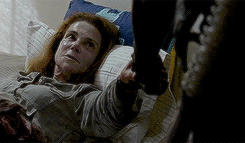
I also think Deanna saw herself and Reg in Rick and Michonne and wanted to pass the baton to the two of them because she felt they were the power couple most capable of building the future she believed in. Just like Deanna expressed how happy she was to build a life with her family from start to finish, she wanted Michonne to know she could have that too because it’s really what Michonne most wanted.
But just like Reg and Deanna weren’t only leaders and builders together, Deanna wanted Michonne to know that the person you work so well with can also be the person you fall in love with and who is deeply in love with you too.
I know Deanna would be celebrating when she saw Rick and Michonne finally realize what she’s been knew, which is that they’re perfect for each other. And even with Rick’s “Farmer Rick” era being short-lived, I know Hershel would still be so proud of the way Rick and Michonne grew a beautiful new plant together. 🥰
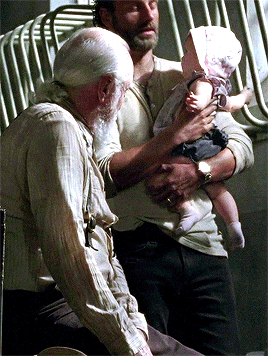
61 notes
·
View notes
Text
DS9 S4 E14 Return to Grace - Slippy Analysis
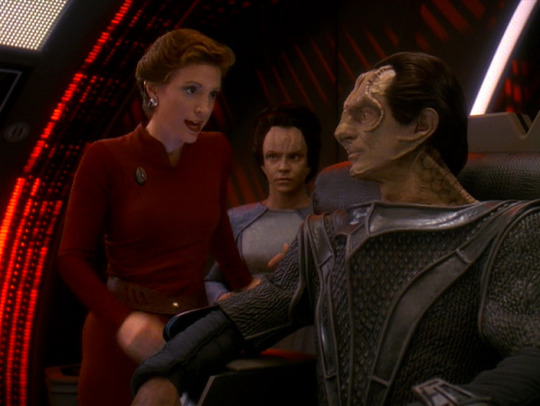
There is an interesting dichotomy at play in this episode. Kira and Dukat actually work well together for practical purposes just as Dukat states. The reason behind this is they each represent a radical philosophy that compliments the other while being in conflict (Kira less so but once held more reckless beliefs. We will get into that).
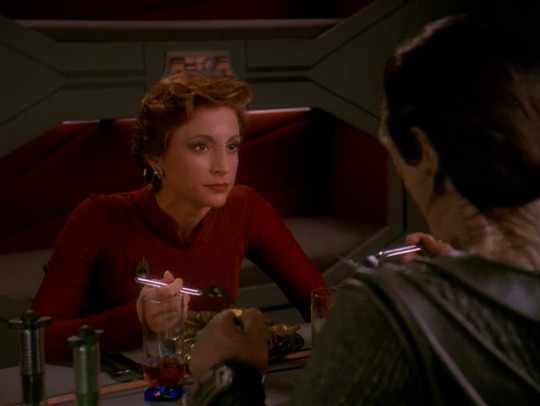
Kira has developed and grown as a character over the past few seasons. At first she was a raw, traumatized soldier still fighting a guerrilla war on the frontlines. In her mind each instance of her life was a continuation of the fight against Cardassian oppressors and torturers. Her life was subjected to unimaginable cruelty and pains that break people down, even people like Kira. She was creative and imaginative, but her recklessness got in the way. Kira lacked the normal capacity for trust that most in a regular setting would innately have. She was in a dangerous state of self-preservation. Her life had one mode, survival mode.
This made her a potent influence for spontaneous solutions and problem solving under immense pressure and little time to act. A perfect source of utility for Dukat in his current fallen state.
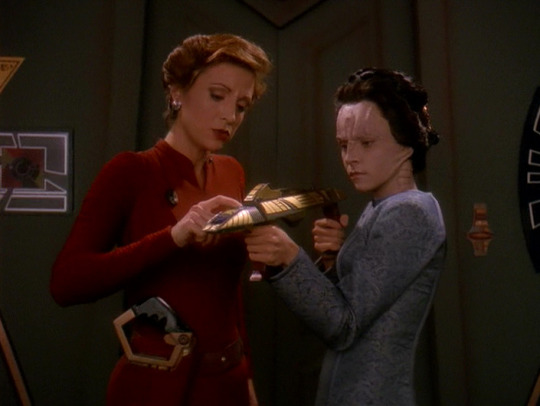
We see these traits in detail as she explains the weaponry differences to Tora Ziyal (our lovely little adopted sister). Kira knows how to be lethal. She was once prepared to fight everyone around her because she never knew when the battle would begin, so she would just star a battle to keep things on recognizable terms. She was chaotic. These are not all bad things. These traits kept her alive and made her indispensable to the Resistance and the Bajoran Provisional Government.
But she was given security and love when she was stationed on DS9. She was given a place where she could safely open up to others, learn to delegate emotional dependency on worthy people around her, and finally begin to remove the walls that so viciously kept her from the kind people in her life. She could be loved. She could be vulnerable. She could be in a state of emotional peace that so many of us crave.
Eventually you need to set down the weapons. Kira learned this. She has been able to create relationships that sustain her and help her heal from years of trauma.
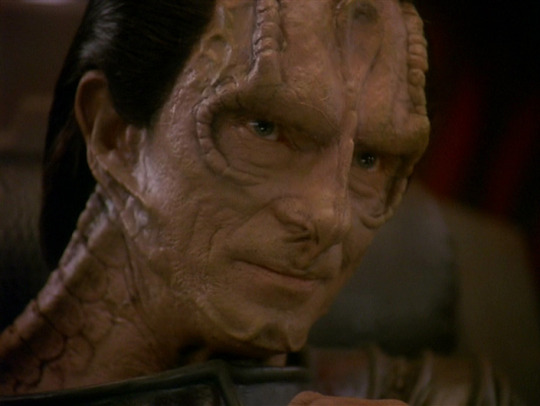
We need to take a detour and compliment these prosthetics. With each movement they seem organic and do not fold like plastic. They move with Marc Alaimo's body. It is incredible to witness.
Gul Dukat is the polar opposite to all of Kira's traits. He is violent by choice and not by external trauma, even though it could be argued that much of Cardassian society and history is traumatic. He expresses violence because of his overconfidence born of authority. He represents bureaucracy, extreme order, and an expectation that all things will comply with his desires.
When he becomes uncomfortably flirtatious with Kira we see that power struggle of his desire for control against Kira's will to be autonomous. He hides behind a controlled persona with the hopes that he can control Kira. He serves his own wicked ambitions.
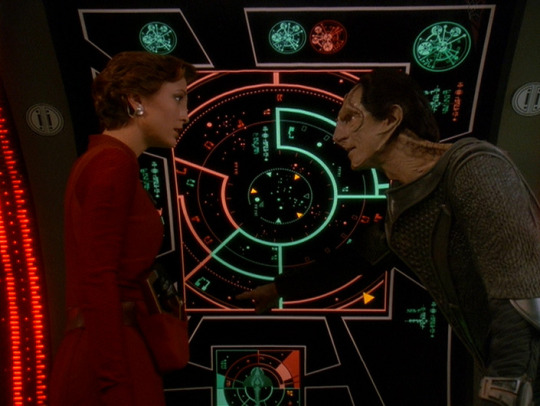
Those computer designs are beautiful! Okay, detour over.
Together they both are what the other needs to transition into with some moderation.
Kira still represents the freedom fighter that Dukat now needs to become in order to regain his position as a military leader for Cardassia.
Dukat showcases the diplomat, the "traditionalist", and commander that Kira has been forced into becoming by the Provisional Government. Traits that Kira can learn and tailor into what she feels is genuinely her. She still rejects the pieces that do not fit, and rightly so, but she is growing into an iteration of herself that is happier, healthier, and more completely her.
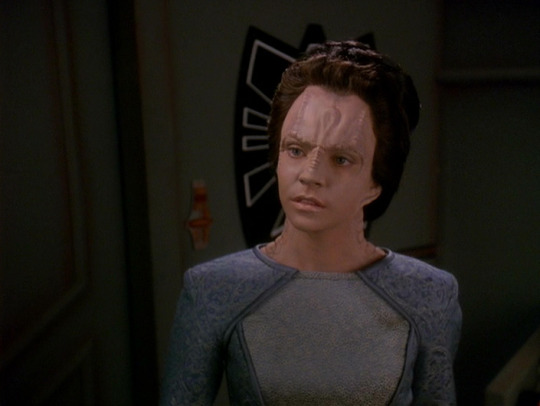
And here is the glimpse of growth that makes Dukat particularly fascinating. Tora Ziyal.
From her perspective Dukat has given up everything that he finds important in order to be her father. He has sacrificed in order to love her. A parent is supposed to do that. Children thrive upon the love and sacrifices their parents make on their behalf.
The incredibly frustrating thing about Dukat is that Ziyal shows that Dukat has it within himself to be great. Imagine if his ambition was to be everything that Ziyal cherished. If he could become a figure of love, authority, and strength that was observable by everyone, and not just the perspective of his daughter, he could have become an incredible protagonist.
His denial of that potential and his descent caused by chasing his base, selfish ambition is the true evil of the episode. He had an opportunity and he threw it away. His lust for power, greed for authority, envy for sexual connection, and perverse obsession with Bajor is his demise. The loss of Dukat's potential is tragic for Ziyal and the rest of us.
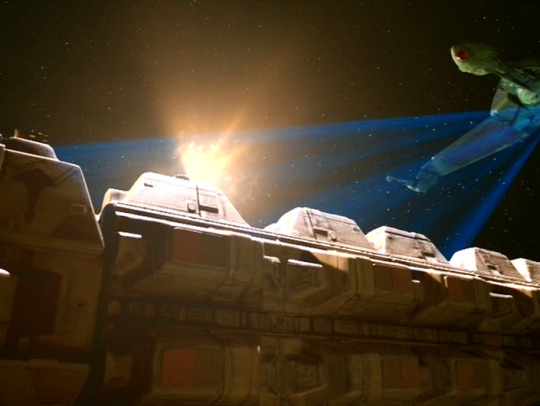
Dukat in a Klingon Birdy of Prey is a recipe for disaster. But still a delicious recipe. I'd eat it.
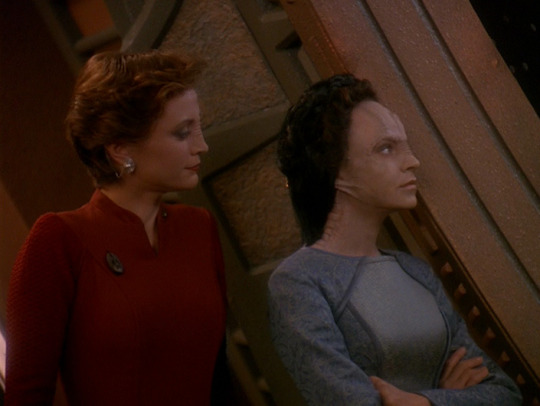
Ultimately, Ziyal embodies what Dukat should have been but never could be humble enough to accept . She has what he wanted from Bajor- independence, untainted ambition, and a positive outlook on what life could be despite the ugly evils around her.
The fact that Dukat had the restraint to let her go is a credit to his potential.
Yet, Kira is the hero here. Don't mistake that. Kira never ceases to deliver as a character. I hope Nana Visitor received an award for her acting efforts as Kira. Her ability to lead someone as viciously authoritarian as Dukat displays her strength of charisma.
Imagine how fiercely protective Dukat would have had to become regarding Ziyal. He was committed to killing her before he decided to reject his inner evils and accept her into his life as a permanent fixture of his family. That is a huge change of character. He faced immense opposition and pressure from Cardassian society, his career, and his own family. Yet, he maintained the course and went all in for Ziyal.
Now Kira tells him that he must let her go to DS9 and be out of his care. Given his personality that is no small ask. Kira convinced him to agree because she taught Dukat that Ziyal will be condemned to turn into something like him if he refuses.
Well done, Kira! Well done!
Thank you for reading! Now take your sloppy kiss and keep scrolling!
#star trek ds9#star trek#ds9#kira nerys#gul dukat#tora ziyal#s4 e14 return to grace#slippy thoughts#pictures courtesy of trekcore.com
47 notes
·
View notes
Text
Reading Junji Ito's "Billions Alone" from a post-lockdown, culturally individualist perspective
Today, I met up with some local writers at a cafe/comic shop for some group discussion and writing. One of them is a fiction writer like myself; the other is a video essayist. Since becoming more involved in the local artistic scene, both as an artist and a writer, I feel like my mental health has been improving, at least when it comes to my personal life- I'm building a circle of like-minded creatives, surrounding myself with others who have similar beliefs and interests as me. As I'm finding community in the creative scene, however, I'm also realizing that many people I'm meeting feel much of the same way.
At the writers' meeting, while we discussed our stories, our goals, and our writing challenges, the idea of "third spaces" also frequently came up as well. My video essayist friend was talking about a new project studying how public infrastructure is designed to favor drivers over pedestrians, and we all agreed on something that I've been hearing many times in online circles- the internet itself is changing. Despite social media platforms supposedly promising to bring people together, they've only become more isolating as they've become more corporate, AI, and algorithm-driven. We talked how lots of online users are returning to the "old internet," forming their own blogs and seeking an escape from the increasingly stifling major platforms. We discussed how while everything is filled with SEO and short-form content, nobody actually likes TikTok or Instagram, but they've become so ingrained in online society that we tolerate them, using them to promote our small businesses or connect with others.
After the meeting, I decided to look around the comic store, and was drawn to a copy of Junji Ito's manga collection, Venus in the Blind Spot. I'd become a Junji Ito fan way back in college, and his art style has had a big influence on my own work. While I also take heavy inspiration from styles like Expressionism and New Objectivity, and artists such as Edward Gorey and Stephen Gammell, Junji Ito's painstaking pen-and-ink hatching, bulging eyeballs, and grotesque faces have played a distinct role in my artistic growth. However, I didn't own any of his mangas (having read some online), but I'd been wanting to get one so I could study his art style up close. I ended up buying Venus, and after my conversation with my writer friends, it was strangely coincidental that the first story in the collection was Billions Alone.
Junji Ito's Billions Alone tells the story of Michio, a reclusive young man who has a crush on his former classmate, Natsuko. Natsuko is planning a school reunion, and invites Michio to reconnect and meet her new friend group. Meanwhile, a mysterious series of mass murders have been taking place, as a group called "Billions Alone" appears to be killing people en masse and sewing their bodies together. As Michio and Natusko's friends are killed and the heaps of bodies grow bigger and bigger, the public is warned not to form gatherings, and to isolate from one another. Eventually, Michio sees military planes that he thinks are attacking Billions Alone aircrafts, but are actually dropping pamphlets about "coming together" onto the town. As he thinks the government is finally taking action against the murders, he goes to tell Natusko, only to see her sewing the bodies of her family together, implying that the murders have not been carried out by an organized crime group as suspected, but rather civilians being compelled or brainwashed into killing each other. I've seen analyses before that Billions Alone is a commentary on Japan's collectivist culture, and that many of Junji Ito's works critique different aspects of Japanese culture- for instance, Gyo has been interpreted as a metaphor for the Japanese government's denial of atrocities committed by Japan during WW2, such as in Nanking, China, while My Dear Ancestors has been read as a criticism of the concept of filial piety. While these interpretations are certainly fascinating, I admittedly don't know enough about Japanese culture to properly analyze Ito's works from that lens, and will leave that up to people more knowledgeable than I am. However, coming from the United States, which has a heavily individualist culture as opposed to collectivism, Billions Alone resonated with me in a different way, especially after the Covid lockdowns and the increasing isolation of people, ironically in part due to the internet, which has simultaneously allowed people to "come together" and drive them apart.
Before I get into my thoughts on Billions Alone from my own cultural perspective, I want to add a disclaimer- just because Covid lockdowns are over doesn't mean that Covid itself is over. People still get the disease, it's still contagious, and it's still deadly. If you're sick and going out in public, it's common decency to wear a mask; public health is still important. This analysis is not anti-mask or anti-lockdown, but does discuss the social and psychological effects of lockdowns. I'd also like to say that when I call myself "culturally individualist," I mean that I come from an individualist culture, not that I consider individualism to be a superior ideology; both individualism and collectivism have their pros and cons. That being said, back to Junji Ito.
One thing that stood out to me the most in Billions Alone is the way the concepts of togetherness vs. isolation are framed in both positive and negative ways. Natsuko is a very social character; she has a friend group, a fiancee, and is planning the school reunion. She's also the only character shown sewing people together at the end. Meanwhile, Michio is very isolated; he's spent the last seven years at home. He misses Natsuko at the beginning of the story, and while he wants to confess his feelings towards her, while he's been shut up in his house, she's found someone else she loves. Togetherness prevents social death, but it also means physical death. Isolation means mental anguish and loneliness, but it also means survival.
The characters in Billions Alone both crave and are terrified of togetherness. As they're ordered to stay separated by the authorities, many young people, including the main characters, ignore the orders to gather in groups. This definitely brought the Covid lockdowns to mind for me; like the characters in the manga, to protect ourselves and the people we loved, we had to avoid gathering with them. Michio thinks that by the end, the Japanese government "finally" decides to take action combatting Billions Alone, but only after the death toll has become impossible to ignore and increasingly large masses of bodies begin to appear in public spaces. Worse yet, the planes he sees are in the control of Billions Alone, dropping propaganda to even more people (this page points out they're possibly an allusion to Allied planes during WW2; the allusion to John Lennon's music on the radio also makes a possible case for an analysis of the Billions Alone group symbolizing western globalization, but that's a study for another time). Notably, the bodies don't appear in workplaces or the home, but rather in "third spaces"- public parks, hiking trails, and areas being used for parties, like the school reunion. To survive, people must avoid these places, leading them to become more and more isolated. Natsuko's desire for social connection leads her to continue with the reunion despite Michio's insistence, justifying it as a "memorial" for the members of her friend group. However, the auditorium is empty, and she and Michio are confronted with a large web of bodies.
Looking at Ito's (frankly amazing) drawings of the corpses (I found myself analyzing his use of hatching and texture in every single one), I was reminded of the discussion my friends and I had about the modern Internet. In the story, technology is shown as a way to keep people connected while isolating from each other; Michio watches the news on the television for updates, calls Natsuko on the phone, and reads online forums to see what people are saying about the murders. But, as in real life, technology is not a substitute for social interaction, and while people can communicate and receive information over long distances while being isolated, they still continue to gather, despite knowing about the murders. They increasingly rely on technology, but still crave connection, enough to risk their lives for it; even Michio, who is used to being alone, says he wouldn't mind being sewn to his crush Natsuko as he ventures to see her again despite the risks. It's a line that was probably intended to be humorous, but speaks to the fact that even for him, there's only so much isolation he can take. When he sees the military planes, she's the first person he goes to talk to- if not the only person he knows who's still alive.
Overall, I think there's a lot to analyze with Billions Alone, and while I saw some people on the internet also drawing parallels with the Covid lockdowns like I did, I think what we can interpret from it in terms of the long-term increasing isolation of society- while we paradoxically "come together" with the internet- and the disappearance of third spaces is just as interesting. Like my friends and I in the comic store today, the characters are desperate for connection, and lament not being able to have it. Even if isolation may help them survive, they ultimately fall victim to their desire to live.
5 notes
·
View notes
Text
some Coronach timeline/backstory stuff under the cut
They were created in Uktar of 1453 though Bhaal's blood in the winding river during a storm and taken in by the Berrows, a tiefling family (who had guessed that perhaps the child was abandoned due to their tiefling heritage). On their tenth birthday (at least, what they celebrated as such), they killed their parents and sibling—it wasn't the first time they'd ever experienced the Urge, but it was the first time it had been so devastating, and not like... the death of an animal or a minor fixable injury. Terrified, they promptly fucking book it before anyone can find and blame them. They're homeless during this period, the Urges are in full swing, and they have the impulse control of, well, a child, obviously, so it's a pretty rough time for them.
On their fifteenth birthday, they get cornered by people intent on revenge (something Sceleritas had a hand in) for the murders and turn into the slayer. They wake from the transformation to find their enemies in the form of mush and Sceleritas Fel praising them and explaining their heritage. Deeply lonely and by this point thoroughly convinced of their inherent evil, they decide to double down. Sunk cost it all the way! This is when they start going by the Dark Urge.
They spend a couple years looking into Bhaalist religion and at 17 during early/mid 1471, the Urge manages to find a deathstalker who they convince to train them as one. Granted, that "convincing" is mainly Bhaal straight up going "You have to do this btw" through them. At the beginning of 1476, the Dark Urge kills said deathstalker and heads towards Baldur's Gate.
In Tarsakh of 1476, Helena attempts to kill Orin, but gets killed by Orin instead. About a month after that, Coronach shows up at the temple. In Flamerule of 1477, they become a deathstalker and High Primate of the Heartlands. (This is what they were up to during Blood in Baldur's Gate!)
During the 1477-1482 period, they begin preparing for Bhaal's resurrection, eventually getting close enough (or in Ulder's case, getting other people close enough, as they never properly met him) to Duke Torlin Silvershield, Kingpin Rilsa Rael, and Marshal of the Flaming Fist Ulder Ravengard to poison each of them with the Urge's own blood, giving Bhaal some influence over them.
Bhaal's internal and the Urge's external influence lead to the extremity of the conflict after the death of the Grand Duke in 1482, such as, you know, the explosion of the High Hall and the illegal executions. They did do all that <3. The mass sacrifice on Bhaal's behalf and the death of any remaining Bhaalspawn* (...including themself, for a moment), was enough to bring Bhaal back to life. After he returns, he resurrects the Dark Urge and commands them to begin trying to take over the world.
*for my own sanity i choose to believe orin doesn't have enough essence to really impact this. technically she shouldn't have any at all, but evidently she does, but also i really can't see bhaal bringing her back if her death was necessary for the resurrection ritual so.
This is when Gortash becomes aware of the growing Bhaalist presence in Baldur's Gate. Unfortunately for Karlach, he starts finishing up some of his prior major business (such as his main deal with Zariel for infernal iron/engine designs) so if when he contacts the Bhaalists, things go wrong, he'll have the resources to deal with it.
In early 1483, Gortash begins arranging for his people to run into the Dark Urge's. They do some back and forth for a few months, before finally meeting in Kythorn of the same year and shortly after they rob the house of wonders. This is, finally, when the Dark Urge starts calling themself Coronach—it starts off as a made up alias they use specifically in their business with Gortash (and later Ketheric)!
They keep their alliance on the downlow enough that nobody outside their respective temple's notices it for a few years and proceed to spend several years doing crimes against humanity gaining power for their churches together, all the while avoiding being kidnapped by all the various people who want to research the gods' chosen during the Second Sundering (mostly the Red Wizards of Thay).
Then ofc Bane and Bhaal contact them and order them to ally with Myrkul's chosen for world domination and the like. In late 1491, they manage to break into the Mephistar, steal the Crown of Karsus, the Netherstones, and the book on the Grand Design.
The three of them crown the Elder Brain and begin experimenting with the tadpoles, to make them difficult to impossible to remove, not eat the victim, etc. while still allowing for complete control. During this phase, Orin attacks Coronach, tadpoling them with the first successful tadpole of the experiments and leaving them for Kressa to find.
#anyway here's 10 paragraphs of oc backstory so i dont lose it like i lost kaz's pre-tadpole name lmao#01#oc: coronach#'i need to talk about my other ocs more' *posts more coronach*
2 notes
·
View notes
Text
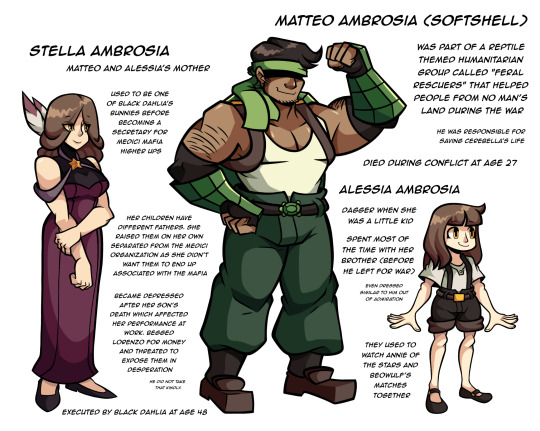
Dagger fam!! I've been wanting to settle on designs for her mom and brother for ages and hey what a better way to do that than in this editing spree I've been having recently
Stella was originally one of Dahlia's bunny girls, proficient in everything firearms related and dedicated to her position in assisting Dahlia in her missions. This all changed when she met one of the men who worked more directly under Lorenzo's influence in the Medici mafia, overtime she eventually became his lover and was given a position as a secretary for higher up members of the mafia, effectively abandoning her post as one of Dahlia's helpers. (Which upset her, but she choose to not do anything about it for the meantime, just generally disappointed in how one of her bunnies turned out)
There's a lot I've put on the image already but here's a more in-depth run of the events for those curious.
It's from this relationship that Stella had her first child, Matteo, who she decided to raise on her own after realizing that her lover didn't take their relationship as serious as she did and most likely wasn't going to divorce his other family to be with her. Besides, Stella was well aware of all the dirth the Medici's are involved with, she wanted to spare her children of going down the same path as her.
He was a sweet boy, with a love for animals and a desire to help those in need, which led to him becoming a medic and later joininythe Feral recuers. Matteo loved his mother and knew she loved and was very proud of him, even if Stella wasn't the best at showing it.
When Stella became pregnant again, from a different, less serious relationship than her last, Matteo was overjoyed about having a little siblings and swore he would do everything to protect her. He was Alessia's role model and favorite person during her early childhood, picking her up from school and spending a lot of time together playing or watching their favorite programs.
When the Grand war started, Matteo and his crew left to help the people from No man's land. Aside from working as a doctor, he also served as a caretaker for the kids they saved there, since he was used to taking care of his sister back home. He helped many people during the 3 years he worked there before sadly passing away after being crushed by debris of a falling building.
His mother was devasted. Alessia was a little too young to fully comprehend what happened, especially with how messy everything became in the following months after Matteo's death.
The ongoing grief made her performance at work worsen more and more each day, especially with how inconsiderate the others around her workspace were of her. She earned less and began to struggle financially, she woule shut herself off in her room a lot, leaving Alessia to be alone most of the time now.
One night, Stella left to talk with Lorenzo, she begged for him to think about her situation and lend her some extra money, growing more desperate as he refused. In a spur of the moment , she threatened to tell the authorities and the Renoir family of everything she knew the Medici was hiding behind closed doors, Lorenzo didn't take that well at all.
She begged for mercy, swore she would do anything and everything the Medici ordered her to if she was spared.
The next day Alessia woke up to an empty house, she waited and waited but her mother never returned. She was startled when two strange men entered the house and went after her, one wore a purple suit and the other had a brown hat and a big beard. She ran away from them and into the busy streets of new Meridian where she quickly got lost and had no idea of what to do from now on.
It was then that she was found by a group of people that comforted her, promising that they would give her a new home and make her strong if she choose to come with them, she agreed and was taken into the Silent stalkers alongside several other children that had become orphans during the war.
She would spend the next 10 years of her life undergoing the organization's heavy training to become one of their assassin's for hire, being renamed Dagger for the weapon of which she had most proficiency using.
#don't expect me to make a Mariana one. she doesn't have a family for me to talk about#not entirely happy with Stella's sprite but that's probably because I wasn't super feeling like editing her#super proud of Matteo's tho he looks exactly like how I've been picturing him in my head#beloved turtle boy#Skullgirls#Skullgirls 2nd encore#skullgirls oc#stuck together#Dagger#Alessia Ambrosia#Matteo Ambrosia#Stella Ambrosia#hyena scribbles#edit#sprite edit
8 notes
·
View notes
Text
The Owl House Season 3 Review: Embracing Change
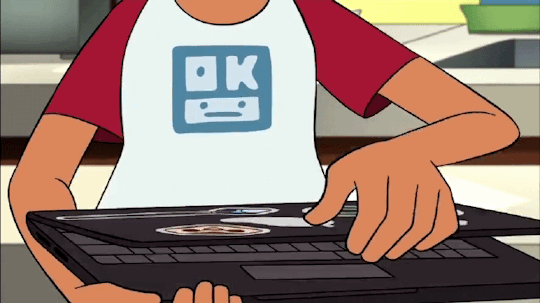
Season 3 of The Owl House concluded with an explosion of heartfelt emotions that no human has ever felt. Luz and her friends are sent into the Human Realm on the Day of Unity with Belos seemingly destroyed by the Collector. Now, with him/them free, the Boiling Isles just became a playground from the god child. As the three specials progress, we get to see how Luz, Eda, King, and many other characters are impacted by the story.
My overall impression was that Dana Terrace and the crew did fantastic with what they were given. This made it even more satisfying to how almost all loose ends were tied up. I loved every second of the specials right up til the end. Although that a fantastic show like the Owl House has left us, we won’t forget it for a very long time. Now, with that out of the way, I want to discuss in detail each special and what I believe their individual themes are.
Episode 1 “Thanks to Them”: Moving Forward
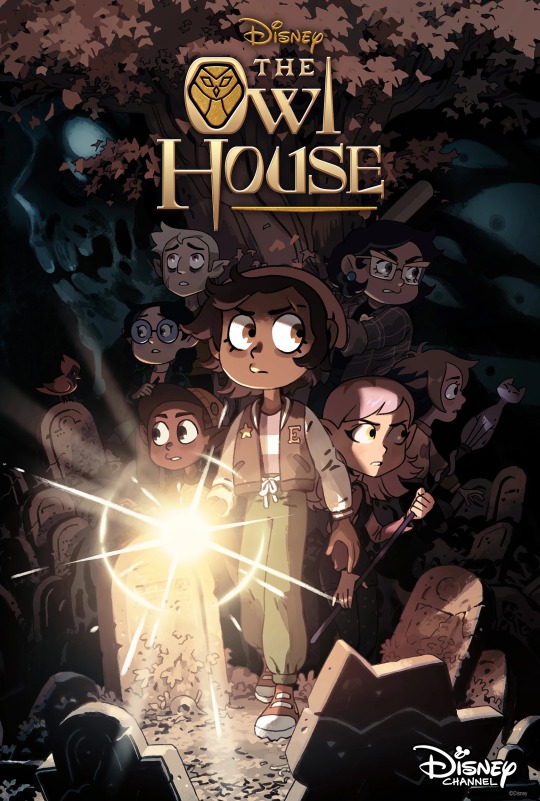
The first episode of Season 3 went off with bang, picking up where Season 2 ended with Luz and her friends in the Human Realm. Luz is grappling with the guilt of unintentionally helping Belos find the Collector while Amity, Hunter, Willow, and Gus adapt to their new settings.
What I love about this special is how the gang adapts to the Human Realm with Hunter thriving to become himself while Luz struggles with her own guilt. We get to see some levity for the gang before jumping back into the realm of chaos that will eventually come. Willow, Amity, and Gus acknowledge that their friendship took time to get there, implying their past experiences before. Halloween itself plays a roll in how we, as the audience, gets more backstory to Caleb and Phillip in the 1600s and their encounter with Evelyn. The holiday also has significance with how it’s a time where the veil between different worlds is at their weakest, thus playing into the gang finding a portal back to the Demon Realm.
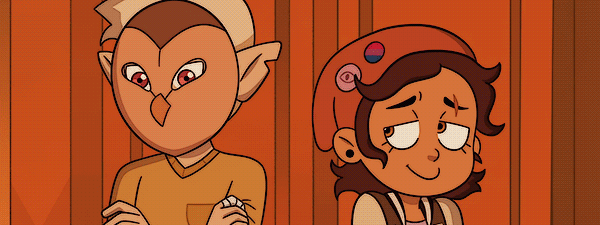
Hunter has the most development with him finally accepting himself as his own person (due to being a Grimwalker) while letting people into his life. His confrontation with Belos possessing him makes more impactful about how he wants to learn to carve Palisman and be a normal student at Hexside. I liked that Hunter was given more agency to his character and flesh out how he’s adapting to his life outside of Belos’ influence.
Camilla gets more context to her reasons for sending Luz off to camp as she wanted to encourage Luz’s more eccentric traits, but felt that the people around her didn’t have their best interests at heart. In the flashbacks, it was revealed that the principle influenced her decision by bringing up that she had a hard time growing up and fitting in.
Luz’s guilt and trauma over what happened during the Day of Unity doesn’t exactly hinder her ability to enjoy her time in the Human Realm. In fact, she even teaches Camilla what she learned about Glyphs. But, she feels that she’s undeserving of her happiness and keeps messing things up. This prompted her decision to stay behind on Halloween. This is pushed aside when her friends encourage her to come with them to stop Belos. While not immediate, Luz does develop to overcome her trauma and not let that define what she does.
Overall, “Thanks to Them” was a fascinating and lovely beginning to the end of Season 3 and made me excited for what would happen next.
Episode 2 “For the Future”: Understanding Yourself

The gang returns to the Boiling Isles as the Collector “plays” with the residents as puppets while Belos tries to regain his strength. They are still reeling the previous events of “Thanks to Them” and still figuring out what happened with the Collector and the aftermath of the Day of Unity. We discover that the Collector is playing out “the Owl House” with King as a game of pretend using people transformed into life-sized toys. The gang find refuge in Hexside with other students under the command of Boscha manipulated by Kikimura. Belos is scrambling for a host to possess, resulting in taking control of Raine and manipulating the Collector once more. We get a cliffhanger with the gang reaching the Titan’s skull, Luz getting her Palisman, and the Collector starting a new “game.”

King and the Collector both stand out in this special as two different characters with almost identical lives as the children of god-like beings who grew up alone. Unlike the Collector, King found his own family in Eda and Luz, growing more mature and understanding before and after finding out his origins as a Titan. Now he wants to try reasoning with the Collector into freeing the people and without violence.
There are good moments of character growth from various characters like Amity choosing her own path against what Boscha wants her to be and Hunter learning to open up about how he feels. Also, Willow gets some growth (plant pun, ha) to becoming more open with her feelings after bottling her emotions for the sake of staying strong for the group.
Finally, we get to see Eda Clawthorne after recovering from her Owl Beast form as she trapped in the Collector’s castle by the Coven Heads as toys while reeling from Luz leaving the Demon Realm. She doesn’t have a lot to do, but it’s great to see her after a long time.
What I felt was pretty underwhelming were some characters like Odalia being a caretaker for King and the Collector, and even the main antagonist Kikimura felt like a one-off bad guy. I would of liked to see more exchanges between Kikimura and the gang about the state of the Coven system and Belos’ reveal as a witch hunter. Like Kikimura still wants to follow the system blindly and make herself the new emperor in spite of its failings, while the gang make their arguments against it.

Luz finally learns to overcome her guilt by having a heart-to-heart with her mother Camilla about how Camilla was much like Luz as a teen but wanted her to grow up without being bullied. This finally allows her Palisman to emerge from their egg after Luz realizes that she wanted to be understood for who she was and have someone know this and embrace her, flaws and all.
Sure, “For the Future” wasn’t the best overall, but it does get the ball rolling. Now, we finally reached the point of no return. Let’s talk about the final special and episode of The Owl House “Watching and Dreaming”.
Episode 3 “Watching and Dreaming”: Embracing the Future

Luz Noceda must face her greatest challenge as Belos possesses the Titan to destroy the Isles once and for all in the final special and episode of the series. Luz, Eda, and King are trapped by the Collector in nightmares surrounding their fears and guilt, but are freed because of the Light Glyph. We get a sort of victory lap around the Boiling Isles as Luz, Eda, and King show the Collector the places that hold the most significance in their lives while teaching him about making friends. Luz is killed and then revived as Titan Luz by the Titan themselves and defeats Belos once and for all. After a time jump, Luz is attending the University of Wild Magic in the Demon Realm with Eda as headmaster, as well as a glimpse into everyone’s lives as they gather for Luz’s King-ceanera. One final scene ends with the entire party saying “Byyyyeee” to the Collector and the audience.
One of the more impactful scenes comes from Luz’s nightmare created by the Collector when each of her friends tells her off about being the villain and everything happening to them was her fault. The ones that hurt the most was Gus saying Luz is a hypocrite for getting her back to the Human Realm while their families are missing and Hunter for how Luz got a Palisman while he lost his own. These details seem like the kind of ideas in Luz’s mind that she make herself feel guilty over. I liked the part that Luz recognizes the trick by hearing “Witch’s Battle” instead of “Witch’s Duel” to cement her fan girl nature of spotting small details from the Good Witch Azura.
Another scene is when Luz, Eda, and King tell the Collector about how they’ve felt alone, abandoned, and misunderstood, but now want to show him how they became friends and a family. They lead him all over the Boiling Isles to have him understand how to make friends without forcing people. First to the Owl House where Luz tells the Collector about meeting her friends and then to the Knee where Luz connected with the Titan. She finally tells him that people are complex and need some kindness and forgiveness. I liked that she tries to teach the Collector about her time because it really did make a great deal of change within her.

The Collector gets major development as we find out he doesn’t understand the concept of death and is using the games he plays as a way to “pretend” to have friends who won’t lie or trick him. Luz taught him about empathy and understanding in order to make friends, only to fail with Belos killing Luz. This leads up to The Collector finally understanding what he’s done as he breaks down in tears while Eda and King turn monstrous from grief. He tries to make up for it by saving the gang in the castle from falling. In the end, he returns to space in order to “grow up” but not before a farewell gift from King.
I loved that Raine Whispers gets a much more significant role in the final special by breaking free from Belos’ possession, trying to stop him, and as a part of the team who takes out Belos. This is great for nonbinary representation to go beyond and become more than just flat cutouts and more fleshed out.
We finally meet the "King and Queen, best of both things” themselves Papa Titan when Luz ends up in the In-Between realm. They explain to Luz, thinking she’s just like Belos, that their feelings to protect their families are genuine while Belos’ desire to save humanity stems from his need of control.
The final death of Belos caught my attention because he does the exact same tactics of manipulating people into getting what he wants and Luz basically being done with his games. This gives us that Belos hasn’t even tried changing his tactics even on the brink of death. We are also treated to the best scene with Eda, King, and Raine curb-stomping Belos to death, treating his death less epic and more hilarious.
“Watching and Dreaming“ was an epic series finale, the animation, story, and characters just flowed almost perfectly with a few nitpicks like the Light Glyph Deus Ex Machina. It almost felt like something that was part of an episode between specials. But that’s nothing with the incredible finale we got out of it.
Conclusion

After watching all of the season, The Owl House gave an uplifting end to its run. The ending was a perfect sendoff to all that Dana Terrace and her team did for the show and what it has given us as an audience. The animation was a major treat with Titan Luz fighting Belos with all the flashy blasts and the smoothness of the movements. That wouldn’t matter if the story wasn’t almost flawless with everything that happened behind the scenes, which is honestly a miracle with most shows that ended abruptly. Most of the characters feel as if they came full circle in their development. I loved every moment of this show (with some exceptions but that’s not important) and hoped for another show like this in the future as an example for years to come.
#the owl house#luz noceda#eda the owl lady#eda clawthorne#king#dana terrace#thanks to them#for the future#watching and dreaming#toh spoilers#gus porter#willow park#hunter#amity blight#papa titan#Disney#disney animation#disney plus#toh season three#toh
30 notes
·
View notes
Text
just a wip of my latest obsession

On a brisk autumn day Aziraphale sits quietly in what will eventually become a souvenir shop in an area not yet calling itself Soho, London. It is right now a growing settlement within the freshly named Kingdom of England. He very much enjoys sitting and watching humans get on with their impassioned—nathaless, very short—lives at a safe distance with little interference, and this place in particular brings something quite unique to the whole experience. Perhaps it is the song they carry inside them, despite their hardships. Or the natural friendless each person emulates around each other. Or the laughter coming from the bellies of nearby children playing beside the water. Whatever it may be, love and therefore God exists within it.
This observation is all in his first visit to the eventual town called Soho, for he knew he would soon return. On his third visit some years later, the people now know him as a little more than a stranger. Not quite yet a trusted ally, but nowhere near an enemy. It is the children who come to love him first.
“What is it you are doing?” asks a small voice one day while he is painting. A new leisure activity taken up to mimic human existence. His hobby of book collecting is still quite brand new and a headache to track in these early years of literacy.
His name is Eustace, the small voice beside him. A young boy of twelve nearly thirteen with innocent eyes and a mischievous look about him. He is very much the definition of adversity, somehow always stuck in the between stages of no good with his father no longer existing and his mother, a most notable adulteress. That is, a whore to the non-angels.
“Painting,” Aziraphale says placidly, though art is like literature in that it has not yet become itself. He uses minerals and organic pigments to revive the sight before him: overgrown strips of various greens blowing in the hectic blue wind with splashes of amber and crimson imitating the setting sun. The boy, curious, touches Aziraphale’s knuckle and follows along as the angel paints. He allows the moment to linger before looking up. “Would you like to have a go?”
Eustace nods, sitting. It is the quietest the boy has ever been. It is the quietest the boy will ever be. He splatters two wobbly shapes onto the wooden panel, exclaiming, “Us,” quite contently.
“Us,” agrees the angel, equally content with the extra additions to his painting.
Eustace—who was born about one hundred years too early to have a last name—is good natured at heart, but has a dreadful temper. “The boy needs discipline is all,” were the wise but drunken words of his father before his timely death just two weeks later.
It is a universal fact that all humans need discipline. Without discipline, they are at risk of becoming permanent pests to society. They are at risk of becoming a great many things, including flat earthers, loud chewers, murderers, Tiktok influencers and, of course, fallen angels.
Crowley’s shadow suddenly looms over them. Something inside Aziraphale bubbles, clearly a heightened angel sense to know when trouble is lurking. “Right now, off you go,” he tells the boy calmly but quickly as they stand.
Crowley half-heartedly—perhaps maybe even a little playfully—kicks the boy as he leaves. “You and your little human pets,” the demon says with a mephitic scent on his breath.
Aziraphale shrinks. “Humans… are not pets,” he insists. They are God’s children and he is to watch over them until his orders say otherwise.
“Hope you’re not too attached to this lot,” he continues, looking on at the growing community around them. “I’ve got direct orders from the big boys downstairs. They’re to all perish in three days time. No survivors.”
“Oh,” says Aziraphale, obviously distraught. He sees the young boy skipping along the path to his home, blissfully unaware of his upcoming death.
“I haven’t yet decided how I’m going to do it. Maybe an accidental fire, or yet another devastating plague. But all that’s very boring, isn’t it?”
“It’s all part of God’s plan,” he says with an unsure nod. “I’m sure of it.” He was given no orders to prevent it from happening, so it must be part of the greater plan. Where there is death, there is also rebirth waiting around the corner.
“Sure, sure,” agrees Crowley absentmindedly. He takes a short pause before continuing, “Do you think death by venomous snakes is a bit too much?” He turns to Aziraphale, but receives no answer. Only a look of worry. He waves the angel off. “Ah, I’ll figure it out. I’ve got three days.”
#good omens#slow start but it’s getting somewhere#a little less thrilling than what it is in my head but that’s life ¯\_(ツ)_/¯#fanfic#fanfiction#good omens fanfiction#if you know my writing you know where this is heading#:)#love you#also ready for s2
9 notes
·
View notes
Text
The Era of Many Foundings
Tepponilamek resides in the Yonder, but their influence is still felt in the Lands Below: Tepponilamek has 0 + 3 + (2d6 => 4 + 1 = 5) – 1 + 1 = 9 power. They spend this power on three efforts of Create City, as the Messonir and Dzadek found many new realms in the beginning of the Third Age.
These cities are Kalikassis, in southern Lekesh, a great trading port; Thorfuintir, in Lanai, a walled bastion in the centre of a sprawling land of small townships, and Gazhiruda in Uukulo, the capital of the small Durran kingdom and a city of oaths and hope.
The Messonir, reeling from the weakening of the Ajuna and their encounters with the humans of Lekesh, spread outwards. Great irrigation works are established in the valley of the Ajuna, but many Messonir still depart. Soon the cities along the river are no longer hard pressed to reach each harvest, and some of their former properity returns. Messonir society remains much the same, but is now more organised and regimented, though not noticeably more hierarchical. These changes only affect the settlements along the Ajuna river valley; those in the delta, or further afield, change little, and this soon becomes a hard division in the Messonir civilisation.
Many of the Messonir, fleeing either the weakening of the Ajuna or the new more ordered Messonir societies, travel to southern Lekesh. There, in an effort spearheaded by the Children of Kalikan, they found a new city; Kalikassis.
Elsewhere, on the continent of Tuula, the Low Kukan – or the Gavu, as the Dzadek disparagingly call them, or the Usfir, as they have started to call themselves – have spent the centuries steadily growing in numbers. Their time in the thick forests of Lanai was initially hard, as they were few in number, spread out, and in a land unfamiliar to them. But they have adapted and thrived. Villages have grown into towns, and new villages founded, the population expanding westwards away from the mountains where the Dzadek dwell.
At the place where two great rivers meet, the ruling families of five important towns gather, and agree to unify, to provide their people with a bastion of strength in the face of increasing raids from the east. The city they found is named Thorfuintir.
Thorfuintir has existed for barely half a century when its first challenge arises; a vast raid by the Dzadek, who burn many villages. Each of the five founding families sends warriors to fight off the invaders; amongst them, Ymnar of the Huntun and Hraseta of the Sretten distinguish themselves, and the invaders break and flee with what loot they can carry before they get close to the city.
One large band of raiders is led by a Dzadek warrior named Gazhuri, who is known for ferocity in battle but melancholy outside of it, and often despairs at the violence that was unceasing in the high mountains where the Dzadek dwelt. This band are separated from their fellows and flee west, deeper into the lands of the Gavu. They come close enough to see the tall walls of Thorfuintir, and upon seeing them Gazhuri falls to his knees and weeps. For he knows in his heart the price of his people’s warring; that they will never build anything great.
Turning to his fellows, he asks them whether they wish to return to their homes, and be the same as their ancestors, locked in senseless bloodshed. Or if they will follow him on a better path. Not one desires to return home.
Travelling in a great arc, Gazhuri’s forces gather up other stragglers from the Dzadek, and to each Gazhuri offers the same choice. Many agree to follow him. He leads them well, and refuses to let any of his forces raid the Kukan where they went. Eventually the band journies west, beyond Thorfuintir; for Gazhuri saw the two rivers flowing near Thorfuintir, and iss sure high mountains lie to the west.
Gazhari is correct; after many months the great band of warriors reach the mountains. Ascending them, they fing a pure and clear lake, around which are villages where small bands of Titans dwell. These Titans revere the great spirit of the lake, Ullustiru, who has heard of the depredations of the Dzadek upon the lake spirits and mountain spirits to the east.
Many of the warriors are wary of the towering, stony beings, and some mutter of binding the great lake spirit; but Gazhuri silences such mutterings. Instead, he speaks to the elders from amongst each band of Titans, and gains permissions for his people to settle. Then, at a great gathering of his people and the Titans, Ullustiru herself makes an appearance in the form of a water-serpent with a dozen coils.
There, Gazhuri swears an oath before her; that he would reject the ways of his ancestors, and not allow the Dzadek to fall once more into civil strife. To consume the blood of another Dzadek, aside from to pass on their gift of the winds grace at the time of their death, was forbidden. So too was the binding of lakes and mountains without their express permissions.
Gazhuri turns to his folk, and asks tha they swear the same oath. They are slow to speak at first, but soon more and more swear, for in their heart of hearts they all followed Gazhuri because they wish to leave behind the violence of their history.
When every Dzadek present has sworn, Ullustiru smiles, and swears in her turn that if they drank of her waters, or bathed within her, then the thirst for the blood of their fellows that consumed every Dzadek would abate for a while. She bids them drink; they do so, and know her words to be true. They cry out in joy, dance along the slakeshore, and sing praises to the lake spirit and even to Tepponilamek, their forgotten creator.
On that spot on the lakeshore, Gazhuri lays the first stone of a city, which is named Gazhiruda in his honor. There his folk, who name themselves the Durra, meaning the Sworn Ones, make their homes.
3 notes
·
View notes